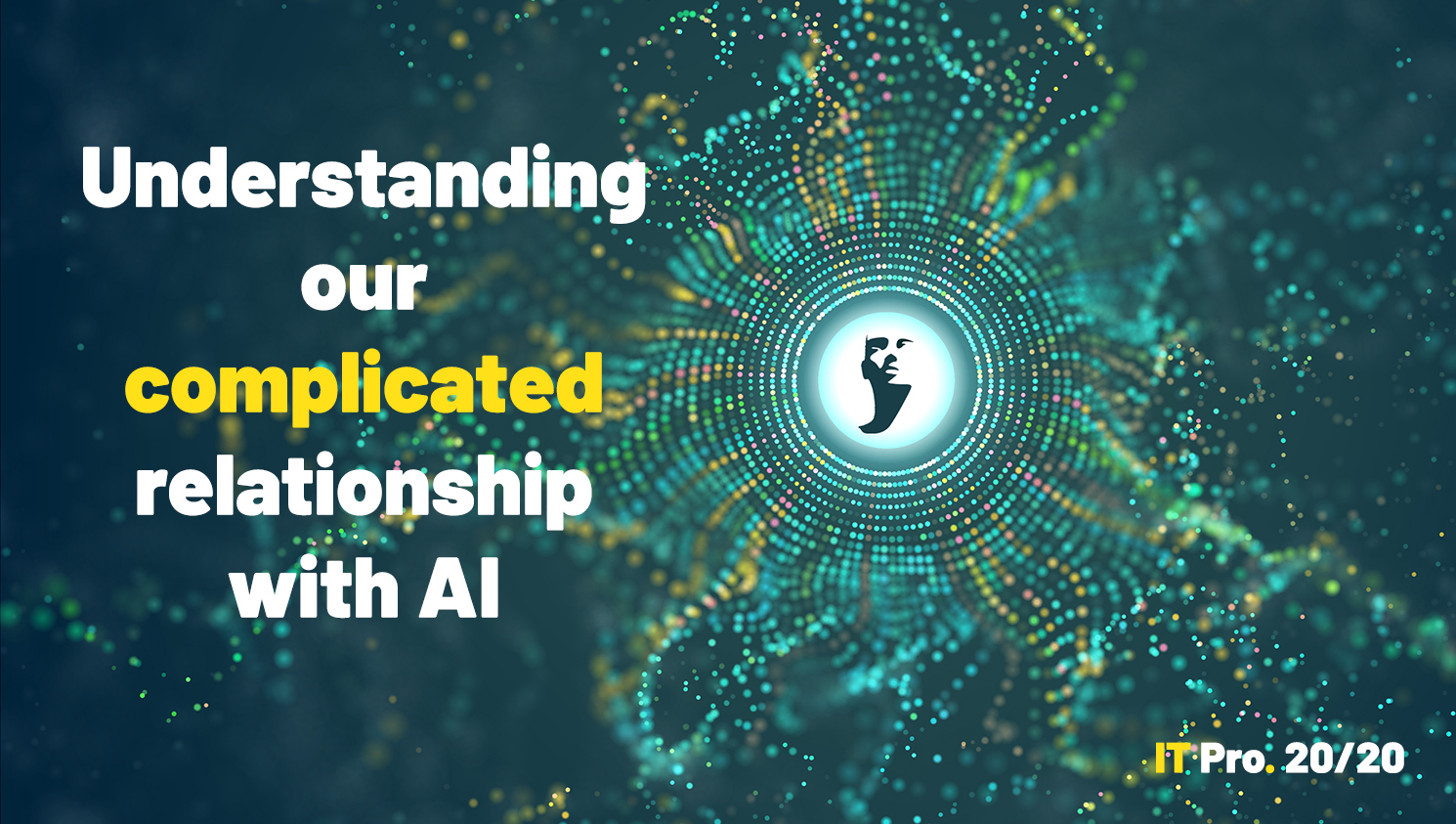Is AI making us lazy?
Some believe automation is making us work-shy, but others believe the benefits outweigh the potential risks


This article originally appeared in the April edition of IT Pro 20/20, available here. To sign up to receive each new issue in your inbox, click here.
Artificial intelligence (AI) is now part of our everyday lives. Many of us now wake up to our lights turning on automatically with the temperature of our home set just how we like it, and that's before we begin interacting with tools such as digital assistants and IoT doorbells, and even automation-powered services that write our emails for us.
As a result of the COVID-19 pandemic, automation technologies have also become more widely used in the enterprise too. Some 73% of organisations worldwide are now using automation technologies, two-thirds of business leaders used automation to respond to the impact of the COVID-19 pandemic, and a quarter of workers have seen a change to their role and ways of working because of the implementation of these technologies, according to research from Deloitte on robotic and intelligent automation.
However, while we've long heard about the benefits of AI for businesses, from the fact that it can enable companies to save time and money by automating and optimising routine processes and tasks as well as increase productivity and operational efficiencies, some believe the technology could be making us lazy.
Dumbing it down
In 2015, Nigel Barber PhD, a biopsychologist and author, wrote in Psychology Today that much like how after the Industrial Revolution people became less physically active and began to gain weight as machines replaced manual workers, reliance on automation could make people less intelligent.
"AI is embedded in many features of modern life for the simple reason that intelligent machines can already outperform humans, including some aptitudes where there was once thought to be a human advantage, such as playing chess or recalling trivia in a game of Jeopardy," he said. "In the future, the electronic assistant will develop to the point that it serves similar functions as a real living butler, fulfilling requests such as: 'Organize a dinner party for six on Thursday, Jeeves, and invite the usual suspects."
"At that point, our long struggle with challenging technologies is at an end. We can take it easy knowing that the hard work of planning and organising is being done by a better brain – the electronic assistant. Starved of mental effort, our brains will regress. The future is an aristocratic fog."
Get the ITPro daily newsletter
Sign up today and you will receive a free copy of our Future Focus 2025 report - the leading guidance on AI, cybersecurity and other IT challenges as per 700+ senior executives
Professor Stefano Puntoni, professor of Marketing at Rotterdam School of Management, Erasmus University (RSM), has also researched how new technology is changing consumption and society and has subsequently warned of the dangers an overreliance on automation can have on humans.
RELATED RESOURCE

IT Pro 20/20: Understanding our complicated relationship with AI
The 16th issue of IT Pro 20/20 looks at the very human problems associated with artificial intelligence
First, he warns, is the risk of deterioration of professional skills that heavy reliance on automation can cause. "For example, most famously, in 2009 an Air France plane crashed into the Atlantic en-route from Brazil to France," Putoni tells IT Pro. "The cause of the tragedy was the pilot's inappropriate response following the disengagement of the autopilot system during a storm.
"Second, we need to avoid becoming complacent. In many situations, human supervision and vigilance remain crucial to ensure all runs smoothly and to step in where necessary to avoid error. For example, the first death in an accident involving the Tesla autonomous driving system was due to a combination of the system mistaking a white truck for the sky and the driver's complete lack of attention."
Putoni also warns that even when tragedy is not involved, AI technologies can create discomfort when it prevents individuals from exerting effort and practising skills that they care about.
"For example, we show that people for whom cooking is an important part of their identity tend to dislike an automated cooking machine when this is presented with the purpose of taking over the cooking responsibilities completely," he adds. "However people's responses became less negative when the same product was presented as still enabling the user's involvement, allowing collaboration between people and technology. Sometimes more automation is not better."
Work-shy AI
Some believe, too, that AI has the potential to make us lazy in the workplace – particularly if the implementation of the technology isn't well thought out.
Jeet Mukerji, lead AI product manager at Beamery, tells IT Pro: "AI has the potential to make us lazy in the workplace if we agree on three things. The first is that the original work, now done by AI, is worth mastering by humans. We choose to not do this, however, so will eventually lose this skill set – empathising, or doing mental maths, for example.
"Secondly, we choose to consistently spend the time and energy, freed up by AI, in lower value moments such as deciding to scroll social media without an aim rather than read a book or to learn a new skill.
"Finally, we choose to not understand the limits of AI we are using, expect too much of it, shirk our responsibility fully on it and don't engage the outputs of the AI correctly – by this I mean we think it is incapable of error, so don't sense check the outputs."
Mukerji believes that we can prevent AI from making us lazy, but to do so we need to make the right choices: We need to understand the technology's limitations by engaging with it correctly and be proactive and curious enough to learn how to improve and add further value.
"A further important point here is that this has nothing to do with AI, but is more focused on general training on how to be a productive human," Mukerji adds.
AI don't agree
Others, however, believe that AI is not making us lazy and suggest it's having the opposite effect: Giving us more headspace to spend on productive and enjoyable tasks at work.
James Coombes, CEO of vector.ai, an AI startup for enterprise operations, tells IT Pro: "It's still surprising today that employees continue to manually reconcile and organise documents and email communications. It's a waste of human talent. The good news is this is a problem AI can solve. There is so much value to be had by adding an intelligent layer that can do the more basic cognitive tasks and give us all our headspace back.
"By automating monotonous tasks like 'answer that email', 'key in that data' and 'find that piece of information', employees can spend their time on delivering great customer service, learning new skills, increasing business development and pursuing passion projects. Not only will this lead to a better and more profitable business but a happy workforce freed from process pain."
This is a viewpoint shared by Rachel Roumeliotis, vice president of Data and AI at O'Reilly, an online learning platform focussing on digital skills, who tells IT Pro that AI will only make us lazy if businesses use it in a lazy way. She says that if the technology is used correctly, it should allow people to be more creative and use their time doing tasks that can make a palpable difference to the business.
"For example, AI can be used to take on the burden of repetitive, administrative tasks, such as reporting. This is work which is often necessary, but which can take a long time and is more of a tick-box exercise than anything else," she says. "The onus, however, is then on businesses to encourage and enable their employees to replace that work with something more engaging and strategic.
"In some instances, this will be easy for businesses. Those hours spent on administrative tasks can be replaced by brainstorms or extra hours of content production. For others, it might require some restructuring of the business. Either way, training should be at the very heart of it. The time saved on performing admin tasks can instead be used by employees to learn new skills and impact the business in a new, innovative way.
"AI shouldn't be making us lazier, it should be enabling greater creativity and a greater sense of fulfilment within work."
Dr Lindsey Zuloaga, chief data scientist at HireVue, also believes that the benefits of utilising AI in the workplace far outweigh the potential downsides – particularly as a result of the COVID pandemic, which has caused workers to suffer from increased workloads and depleted resources over the past 12 months.
"In hiring, for example, recruiters are able to spend less time on scheduling and more time on candidate engagement and personalised interactions, as well as streamlining communication between recruiters, hiring teams and candidates," she tells IT Pro.
"All of these elements facilitate a faster turnaround time for new hires. This is far from laziness, but a modern way of driving efficiency and focusing your staff's time on tasks that hold greater value."
Carly Page is a freelance technology journalist, editor and copywriter specialising in cyber security, B2B, and consumer technology. She has more than a decade of experience in the industry and has written for a range of publications including Forbes, IT Pro, the Metro, TechRadar, TechCrunch, TES, and WIRED, as well as offering copywriting and consultancy services.
Prior to entering the weird and wonderful world of freelance journalism, Carly served as editor of tech tabloid The INQUIRER from 2012 and 2019. She is also a graduate of the University of Lincoln, where she earned a degree in journalism.
You can check out Carly's ramblings (and her dog) on Twitter, or email her at hello@carlypagewrites.co.uk.
-
 Bigger salaries, more burnout: Is the CISO role in crisis?
Bigger salaries, more burnout: Is the CISO role in crisis?In-depth CISOs are more stressed than ever before – but why is this and what can be done?
By Kate O'Flaherty Published
-
 Cheap cyber crime kits can be bought on the dark web for less than $25
Cheap cyber crime kits can be bought on the dark web for less than $25News Research from NordVPN shows phishing kits are now widely available on the dark web and via messaging apps like Telegram, and are often selling for less than $25.
By Emma Woollacott Published